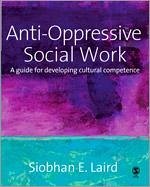`This is an exciting and valuable book. In considering the role and importance of cultural competence in professional practice with diverse populations, it provides a refreshing and much needed approach to social work theory and practice' - Kwame Owusu-Bempah, Reader in Psychology, University of Leicester
Anti-Oppressive Social Work: A Guide for Developing Cultural Competence aims to improve social work training and practice by arguing that a thorough understanding of people's values, social norms and family arrangements are crucial to achieving culturally sensitive practice. The book moves beyond traditional conceptions of anti-oppressive and anti-racist practice by exploring the cultural heritages of some of the main ethnic minorities living in the United Kingdom, and by identifying the many forms that racism can take.
The book includes:
"an introduction to the context and history of ethnic minorities living in Britain
"adiscussion of the nature of racism
"individual chapters on: communities with roots in India, Pakistan, Bangladesh, the Caribbean, and China.
" a separate chapter on economic migrants, refugees and asylum seekers
"a range of practice examples which encourage students and practitioners to identify general principles which underpin cultural competence.
Critical, yet acessible, the book opens up possibilities for more culturally aware and more effective social work practice. It will be essential reading for all those training to become social workers as well as practitioners wishing to engage with fresh perspectives on anti-oppressive practice.
Siobhan Laird is a lecturer in social work at the University of Sheffield. She has previously worked in practice and academic roles in Northern Ireland and Ghana.
Anti-Oppressive Social Work: A Guide for Developing Cultural Competence aims to improve social work training and practice by arguing that a thorough understanding of people's values, social norms and family arrangements are crucial to achieving culturally sensitive practice. The book moves beyond traditional conceptions of anti-oppressive and anti-racist practice by exploring the cultural heritages of some of the main ethnic minorities living in the United Kingdom, and by identifying the many forms that racism can take.
The book includes:
"an introduction to the context and history of ethnic minorities living in Britain
"adiscussion of the nature of racism
"individual chapters on: communities with roots in India, Pakistan, Bangladesh, the Caribbean, and China.
" a separate chapter on economic migrants, refugees and asylum seekers
"a range of practice examples which encourage students and practitioners to identify general principles which underpin cultural competence.
Critical, yet acessible, the book opens up possibilities for more culturally aware and more effective social work practice. It will be essential reading for all those training to become social workers as well as practitioners wishing to engage with fresh perspectives on anti-oppressive practice.
Siobhan Laird is a lecturer in social work at the University of Sheffield. She has previously worked in practice and academic roles in Northern Ireland and Ghana.


